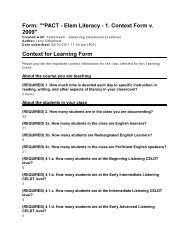The Tutoring Book - California State University, Sacramento
The Tutoring Book - California State University, Sacramento
The Tutoring Book - California State University, Sacramento
Create successful ePaper yourself
Turn your PDF publications into a flip-book with our unique Google optimized e-Paper software.
Despite the fact that their struggles are similar, there are also two fundamental differences<br />
in graduate level writing. First are the high expectations mentioned earlier and the other is the<br />
knowledge of writing in their specific discipline. <strong>The</strong> tutee’s discipline will demand expert<br />
knowledge of a particular writing style and its conventions and he or she maybe be unaware how<br />
to identify or use them. As a tutor, you will work with students from disciplines ranging from<br />
business and engineering to nursing and social work, or in Rina’s case, cultural studies and<br />
anthropology. At some point you will be asked to help them with a style you are unfamiliar with,<br />
but don’t worry. <strong>The</strong>re are things you can do to help your tutee find the writing information they<br />
need. For example, if you are unsure how civil engineers format their essays, you can look up<br />
example essays online, ask colleagues in the writing center, or ask the coordinator for help<br />
finding resources.<br />
In addition to looking to colleagues for help, the following tips will help you if you find yourself<br />
stuck.<br />
•First, remember that regardless of how advanced the writer or writing, there is always room for<br />
improvement. Writing that looks perfect can always be better, and experienced writers can work on new<br />
elements of writing.<br />
• If you are having difficulty with the discipline conventions, take some time to familiarize yourself with<br />
the conventions early in the semester. You might also consider studying the citation or formatting styles<br />
you are less familiar with, which will benefit all of your tutoring sessions. Having some knowledge about<br />
conventions will give you confidence as you tutor.<br />
• If the terms that your tutees use are unfamiliar, don’t be afraid to ask for clarification. After all, we<br />
work with tutees from various disciplines, and it is highly unlikely that you will be familiar with every<br />
subject they present in their writing. Keep in mind, that our tutees are writing for particular audiences<br />
who may have an established knowledge base on the subject. Ask the tutee about the audience, and<br />
• Finally, just like you would an undergraduate or less experienced writer, look for higher order<br />
concerns (HOC) first followed by lower order concerns (LOC). HOCs include thesis or focus,<br />
audience, purpose, organization, and development; meanwhile, LOCs are sentence structure, punctuation,<br />
spelling, and word choice (OWL). You always want to start by looking at the big picture first, and work<br />
your way down to smaller sentence and word level issues, regardless of the tutee’s writing level.<br />
Armed with this mental checklist, I have since felt ready to ask questions, give advice and suggestions for<br />
improvements where I can, and finally, I feel confident in my graduate tutoring<br />
sessions and most tutees will appreciate any help or insight you can provide.<br />
-------------------------------------------------------------------------------------------------------------------<br />
I read Rina’s thesis aloud, paying no attention to the content, as I struggled to think about what I would<br />
help her with. Finally, I stopped reading, sat back, and asked her to talk me through<br />
the topic. As she explained it, the content started making sense and I began thinking that I could<br />
follow along.<br />
Feeling better, I read on; however, this time I paid close attention and recalled my thought<br />
process for tutoring less experienced tutees. I started with HOCs and before long, I noticed a<br />
section where Rina wrote about characteristics, results, and then more characteristics. Even<br />
though I still did not understand exactly what those characteristics were or meant, I could tell<br />
that they seemed out of order. It turned out that while Rina has an excellent writing style, perfect<br />
51

















